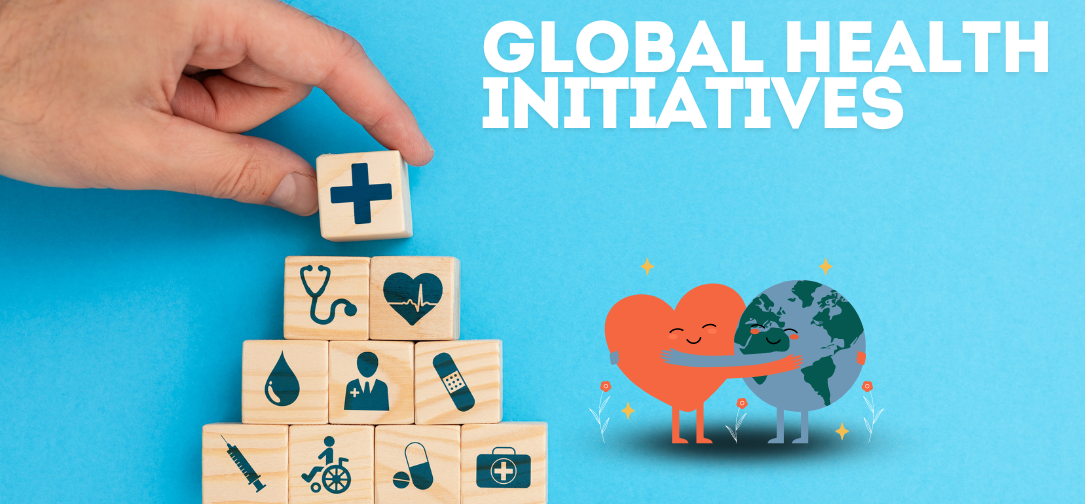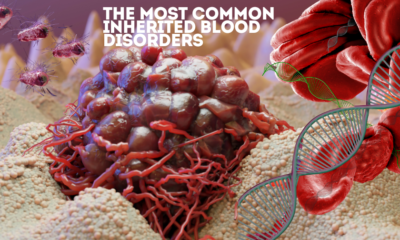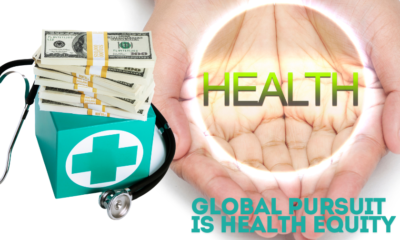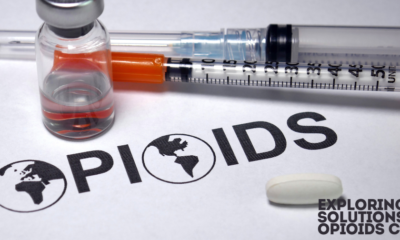Public Health
Global Health Initiatives: Collaborating for a Healthier World

Global health initiatives are crucial for addressing the complex health challenges faced by the world today. These initiatives are driven by collaborations among governments, international organizations, private sector entities, non-governmental organizations (NGOs), and civil society. The goal is to build a healthier world by improving healthcare access, quality, and equity, as well as addressing pressing global health threats like pandemics, antimicrobial resistance, and non-communicable diseases (NCDs).
1. The State of Global Health: Key Statistics and Challenges
Global health faces a paradox where, despite substantial investments in healthcare of over $8 trillion annually worldwide, significant health inequities and access barriers persist. The World Health Organization (WHO) highlights that around half of the world’s population lacks access to essential health services, and approximately 100 million people are pushed into extreme poverty each year due to out-of-pocket healthcare costs.
Among the key global health challenges are communicable diseases (such as HIV/AIDS, malaria, and tuberculosis), NCDs (including heart disease, cancer, and diabetes), and emerging threats like antimicrobial resistance (AMR). The ongoing COVID-19 pandemic further exposed vulnerabilities in global health systems and underscored the need for stronger international collaboration to prevent and respond to such crises.
2. Collaborative Efforts and Key Initiatives
Various initiatives have been launched to promote collaboration for a healthier world. These initiatives are often aligned with the United Nations Sustainable Development Goals (SDGs), particularly SDG 3, which aims to ensure healthy lives and promote well-being for all ages. Key collaborative efforts include:
The Global Action Plan for Healthy Lives and Well-being for All (SDG3 GAP): Launched in 2019, the SDG3 GAP brings together 13 multilateral health, development, and humanitarian agencies to accelerate progress on health-related SDG targets. The initiative focuses on strengthening coordination among agencies to provide streamlined support to countries, thereby reducing inefficiencies and enhancing the impact of global health actions. This plan emphasizes country-led approaches and encourages collaboration at both local and global levels to achieve health equity and universal health coverage (UHC) (WHO, 2024).
An Accord for a Healthier World: Initiated by Pfizer, this first-of-its-kind program aims to provide equitable access to high-quality, safe, and effective medicines and vaccines in 45 low- and lower-middle-income countries. Under the Accord, Pfizer committed to offering its patent-protected medicines and vaccines on a not-for-profit basis to these countries. The Accord also fosters partnerships to address barriers to healthcare access beyond mere supply issues, such as infrastructure, storage, diagnosis, and healthcare professional training (Global Health Progress, 2024).
COVAX and Global Vaccine Initiatives: The COVID-19 pandemic led to the creation of the COVAX initiative, a global collaboration co-led by Gavi, the Vaccine Alliance, the Coalition for Epidemic Preparedness Innovations (CEPI), and WHO. COVAX aimed to accelerate the development, production, and equitable access to COVID-19 vaccines. By 2024, COVAX had delivered over 1 billion COVID-19 vaccine doses to low- and middle-income countries, highlighting the power of global partnerships in addressing pandemics (World Economic Forum, 2024).
Global Health Security Agenda (GHSA): GHSA is a global initiative launched in 2014 to strengthen countries’ capacities to prevent, detect, and respond to infectious disease threats. It involves more than 70 countries, international organizations, NGOs, and private sector companies. The GHSA emphasizes the need for robust public health systems, efficient surveillance, rapid response mechanisms, and collaboration across sectors to prevent future pandemics.
3. Addressing Antimicrobial Resistance (AMR)
Antimicrobial resistance (AMR) is a significant global health challenge that threatens to undermine the efficacy of modern medicine. AMR occurs when bacteria, viruses, fungi, and parasites evolve and become resistant to antimicrobial drugs. Overuse and misuse of antimicrobials in healthcare and agriculture have accelerated the emergence of resistant strains, making common infections harder to treat and increasing the risk of disease spread, severe illness, and death.
The United Nations, WHO, and G7 countries have prioritized combating AMR. Several international meetings, including the United Nations High-Level Meeting on AMR, have resulted in commitments to enhance global surveillance, promote responsible antibiotic use, and increase investment in new drug development. Moreover, the G7 has committed to advancing microbiological surveillance, primary prevention, and antimicrobial stewardship (World Health Summit, 2024).
4. Women’s and Children’s Health: Priorities for Global Health
Empowering women and children is central to advancing global health and achieving the SDGs. Ensuring their health and well-being not only leads to stronger communities but also accelerates progress towards equity and economic development. Despite progress since the 1994 International Conference on Population and Development (ICPD) in Cairo, significant gaps remain in achieving universal access to sexual and reproductive health, reducing maternal and child mortality, and addressing gender-based health inequities.
Key strategies to advance women’s and children’s health include upholding international commitments, investing in innovative solutions and partnerships, reducing health disparities, and promoting diverse leadership in healthcare settings. Addressing systemic inequalities, particularly in marginalized communities, and integrating gender-sensitive approaches into health policies and practices are essential for achieving a healthier, more equitable world (World Health Summit, 2024).
5. The Role of Private Sector and Public-Private Partnerships
The private sector has a significant role in global health initiatives through corporate social responsibility (CSR) efforts, public-private partnerships, and investments in health technologies. Companies like Pfizer have demonstrated how private sector engagement can foster health equity by providing not-for-profit access to medicines in lower-income countries and supporting healthcare system strengthening efforts. The private sector can also contribute to global health by investing in digital health, telemedicine, diagnostics, and innovations that enhance healthcare delivery and accessibility.
Public-private partnerships, such as those between companies, governments, and international organizations, can drive innovations, pool resources, and scale up solutions to meet global health challenges more effectively. Such collaborations can address infrastructure gaps, strengthen health systems, and ensure more equitable access to essential healthcare services (Global Health Progress, 2024).
6. A Path Forward: Strengthening Global Health Collaboration
To achieve a healthier world, a united, multi-sectoral approach is essential. Strengthening global health initiatives involves the following key actions:
- Promoting Health Equity: Ensuring that all people have equal access to quality health care, regardless of socio-economic status, location, or gender, is fundamental. Health equity must be prioritized in policies, funding, and health systems design to address the needs of marginalized and underserved populations.
- Increasing Investment in Health Systems: To combat future pandemics and address current health challenges, countries must invest in resilient health systems that provide universal health coverage (UHC) and protect against catastrophic health expenditures.
- Fostering International Cooperation: Collaboration among countries, international organizations, the private sector, and civil society is vital for building robust health systems, advancing health equity, and achieving the SDGs.
- Embracing Innovation: Leveraging technology, research, and innovation can drive significant improvements in healthcare delivery, accessibility, and quality. Digital health tools, data-driven solutions, and new treatment modalities can enhance the reach and effectiveness of global health programs.
- Strengthening Leadership and Governance: Effective leadership and governance in global health are critical to ensuring that initiatives are well-coordinated, impactful, and sustainable.
Conclusion
Global health initiatives represent a collective effort to address health disparities, enhance healthcare access, and ensure a healthier future for all. By fostering collaboration, innovation, and equitable access to healthcare, the global community can overcome current health challenges and build a more resilient, healthier world.
-

 Stock Market6 days ago
Stock Market6 days agoUS Stocks Soar as Court Blocks Trump Tariffs and Nvidia Delivers Strong Earnings
-

 African News7 days ago
African News7 days agoUS Imposes Sanctions on Sudan Over Chemical Weapons Allegations
-

 Government6 days ago
Government6 days agoCongress Passes Continuing Resolution, Averting Government Shutdown
-

 Press Release5 days ago
Press Release5 days agoCV5 Capital Announces Standout Performance of Cryptanium Fund I SP, Beating Industry Benchmarks
-

 Alternative Energy6 days ago
Alternative Energy6 days agoShalom Lamm on Rising Rent and the Future of Housing
-

 Government5 days ago
Government5 days agoExperts Warn of U.S. Slide Towards Authoritarianism Under Trump Administration
-

 Business2 days ago
Business2 days agoS&P 500 Soars in Best May in Decades Amid Tariff Relief and Nvidia’s Surge
-

 Immigration2 days ago
Immigration2 days agoTrump’s Immigration Crackdown: Legal Battles and Policy Shifts





























